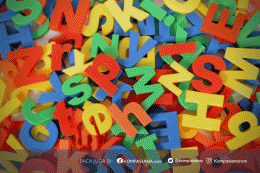Do you know that there are many unique facts that not everyone knows, maybe you are just studying the material, but have you ever thought about what unique facts are in English?? We will tell you unique English facts that you should know.
1.English originates from Germany and the Netherlands English is a West Germanic language originating from Anglo-Frisian dialects brought to the island of Britain by Germanic immigrants from parts of the northwestern part of what is now the Netherlands and Germany.
2.Words that have no meaning Due to a printing error, there is a word in the English dictionary from 1932 to 1940 that has no meaning, you know, 'Dord'. This word is known as the 'ghost word'
3.Do you know why computer keyboards and typewriters have lists of letters like that and don't follow the alphabetical list? The reason was that at the beginning of the typewriter, the keys needed to be arranged in such a way that the letter printing machine was not problematic and damaged. Letters need to be separated so that letters that are used frequently are not next to each other.
4.Ze/Hir. Ze and hir are gender neutral pronouns that are slowly gaining popularity. This is different from gender-defined pronouns, namely he/him (masculine) and she/her (feminine). My friend is very happy that ze will come to the party later.
5.English spelling was complicated by William Caxton. William Caxton was an Englishman who famously founded the printing press. He employed Flemish workers who spelled some of the vocabulary the way they had always spelled it. So that there are several spelling in English that are complicated and different from the usual rules.
6.'I' is the shortest word in English I' which in Indonesian means I, is the shortest word in English that is most often used.
7.The longest word in English consists of 45 letters. The longest word in English is 'Pneumonoultramicroscopicsilicovolcanoconiosis' which means lung disease caused by inhaling dust and ashes.
8.The English Dictionary was first written in 1755. The first dictionary was written by Samuel Johnson also known as "A Dictionary of the English Language" which was also published as "Johnson's Dictionary".
9.The words "girl" and "man" have no gender. In modern English, the word "girl" always means a girl (or young woman), and the word "man" always means a grown man. But it wasn't always like that. Until the 1300s, "girl" just meant a small child and it could mean a girl or a boy. The word “man” only means a person and not just a man.
10.English is the third most spoken language in the world. the first and second are Mandarin Chinese and Spanish.
11.On average, one new word is added in English every two hours and about 4000 new words are added to the English dictionary every year.
12.There are words in English whose form is always plural, such as glasses (spectacles), binoculars, scissors, shears, tongs, gallows, trousers, jeans, pants, pajamas, (provided that the word cloting becomes singular ( singular) when we use it as a modifier, as in “trouser pocket).
13.The present-day English accent first appeared among upper-class Londoners during the American Revolution. Previously, the British English accent was the same as American English. 14. The letter “E” is a letter that is often used in English. As it turns out, one in eight of all the letters written in English is the letter “e”
15.There was no word for the color orange in English until about 450 years ago. In the past, the orange color was called “geoluhread” which means reddish yellow in Old English.
16.English is a crazy language. Why crazy? Because there is no Egg in eggplant; no ham (pork) in the hamburger; there is no apple or pine in a pinneapple; English muffins don't exist in England; quicksand works slowly; boxing ring (boxing ring) in fact the shape of a box (he said ring = ring); if vegetarians are people who eat vegetables then what do humanitarians eat? (does he eat humans?)
17.A word formed by combining two words is called a “blend” (“portmanteau word”). Many new words enter the English language this way. For example the word “brunch” (from the word breakfast + lunch); “motel” (motorcat + hotel); and "guesstimate" (guess + estimate), provided that the word blend is not the same as a combined noun, such as website, blackboard, and darkroom.
18.There are words in English whose form is always plural, such as glasses (spectacles), binoculars, scissors, shears, tongs, gallows, trousers, jeans, pants, pajamas, (provided that the word cloting becomes singular ( singular) when we use it as a modifier, as in “trouser pocket).
19.The word “OK” dates back to 1839 when newspapers used it as a humorous shorthand for “oll korrect”.
20. 80% of all paragraphs written in English contain the word “the”.
Well, what do you think? Interesting right?? Hopefully the information from us helps well for your knowledge.
Baca konten-konten menarik Kompasiana langsung dari smartphone kamu. Follow channel WhatsApp Kompasiana sekarang di sini: https://whatsapp.com/channel/0029VaYjYaL4Spk7WflFYJ2H







